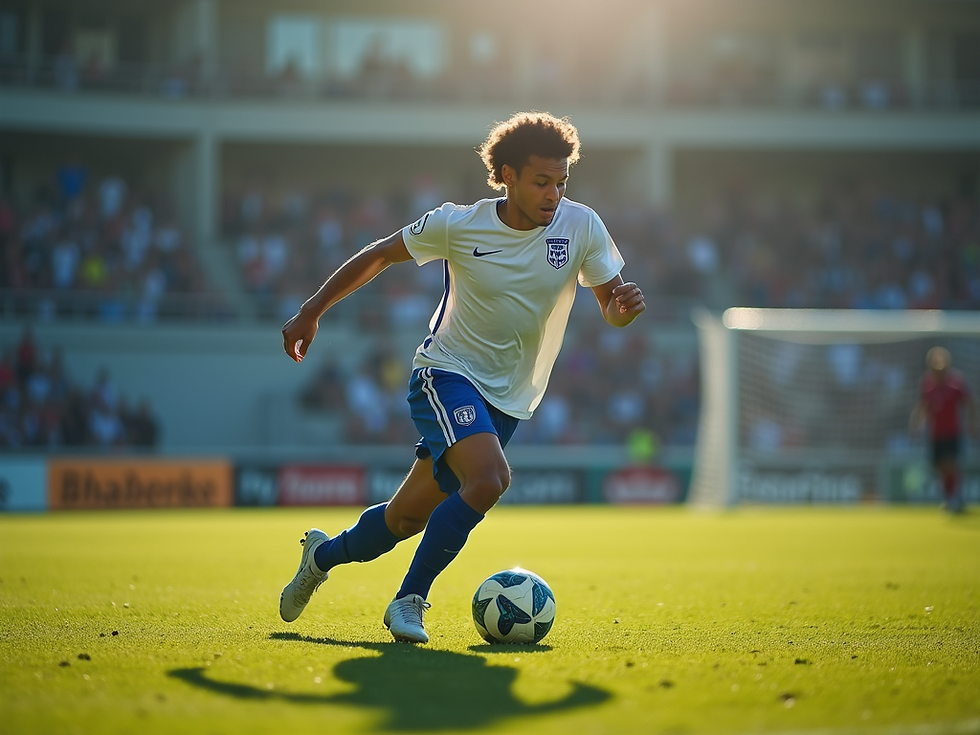How to Develop the Footballer’s Mindset: Proven Sports Psychology Strategies for Peak Performance
- Dr Paul McCarthy

- Aug 9, 2025
- 6 min read
Introduction: The Mental Game Behind Football Excellence
When we think about what makes a great footballer, physical attributes like speed, strength, and technical skill often come to mind first. However, what separates good players from elite performers is often what happens between their ears. The footballer mindset is increasingly recognized as the decisive factor in achieving consistent peak performance on the pitch.
“Developing a strong footballer mindset is essential for consistent performance on the field,” explains Dr. James Thompson, who has worked with Premier League players for over a decade. This mental edge isn’t something players are simply born with—it’s systematically developed through proven sports psychology techniques.
This article will guide you through the essential mental training for football that professionals use to gain a competitive advantage. Whether you’re a player looking to elevate your game, a coach wanting to support your team’s mental development, or simply interested in the psychological aspects of football performance, these strategies will provide valuable insights into the champion’s mindset.

Understanding the Footballer Mindset: The Foundation of Excellence
The Four Pillars of a Champion’s Mental Framework
The footballer mindset encompasses both mental toughness and tactical awareness. Research with elite players has identified four fundamental characteristics that define the psychological framework of peak performers:
1. Vision and Goal Setting
Professional players don’t just dream of success—they systematically plan for it. This involves:
Setting specific, measurable performance goals (not just outcome goals)
Understanding the sacrifices required to achieve these goals
Maintaining long-term commitment to continuous improvement
“The mindset of a football player must balance confidence with humility,” notes sports psychologist Dr. Sarah Williams. “The best players have clarity about where they want to go and what it will take to get there.”
2. Positive Challenge Response
How players respond to challenges often determines their career trajectory:
Elite players view obstacles as growth opportunities rather than threats
They maintain consistent performance levels despite external pressures
They embrace adversity as a tool for development
3. Strategic Risk Management
The footballer mindset includes a calculated approach to risk:
Taking appropriate risks at the right moments
Learning valuable lessons from unsuccessful attempts
Progressively developing skills through challenging situations
4. Self-Efficacy Development
“Professional players work with specialists to cultivate the ideal footballer mindset,” explains former Manchester United performance coach Tony Strudwick. This includes:
Building unwavering belief in personal capabilities
Maintaining motivation through setbacks
Developing resilience in the face of criticism and pressure
Mental Training for Football: Pre-Match Preparation Techniques
Structured Mental Preparation Routines
Effective mental training for football should be integrated into regular practice sessions. Elite footballers follow systematic pre-match preparation routines that incorporate both physical and psychological elements:
Physical Preparation with Mental Components
Systematic warm-up routines that include mindfulness elements
Mobility work paired with focus-enhancing techniques
Sport-specific conditioning with mental engagement
Advanced Psychological Techniques
1. Mind-Body Reset Protocol
“Players who engage in mental training for football report better focus during high-pressure situations,” notes Dr. Williams. This protocol includes:
Controlled breathing exercises (4-7-8 technique)
Brief mindfulness practices to center attention
Neural pathway activation through visualization
2. Performance Anchoring
Many professional clubs now have a football psychologist on their support staff who helps players develop:
Personalized cue words that trigger optimal performance states
Focus triggers to quickly regain concentration after distractions
Mental switching techniques to transition between different game phases
Visualization Techniques for Footballers: Seeing Success Before It Happens
How to Implement Mental Imagery Effectively
Visualization techniques for footballers should include both skill execution and tactical scenarios. This powerful tool has been used by legends like Cristiano Ronaldo and Lionel Messi to enhance performance:
1. Skill Enhancement Applications
Technical skill visualization: Mentally rehearsing perfect execution of specific skills
Tactical scenario rehearsal: Visualizing effective decision-making in game situations
Performance outcome imaging: Seeing successful completion of key actions
“Regular practice of visualization techniques for footballers can improve decision-making speed,” explains Dr. Thompson. “The brain doesn’t always distinguish between vivid mental practice and actual physical practice.”
2. Confidence Building Protocols
Elite players use visualization techniques for footballers before important matches, including:
Success scenario visualization: Mentally rehearsing overcoming challenges
Pressure situation rehearsal: Visualizing maintaining composure in high-stakes moments
Recovery visualization: Mentally practicing bouncing back from mistakes
Soccer Psychology: Mindfulness and Focus Training
Integrating Mindfulness into Your Football Routine
The field of soccer psychology has evolved significantly in the past decade, with mindfulness becoming a cornerstone practice:
1. Focus Enhancement
Soccer psychology techniques can help players maintain focus throughout the full 90 minutes through:
Present-moment awareness training
Distraction management techniques
Performance state optimization practices
2. Stress Management
“Implementing soccer psychology principles can give teams a mental edge over their opponents,” notes Dr. Williams. These include:
Parasympathetic nervous system activation techniques
Stress hormone regulation practices
Emotional control enhancement methods
A study of professional footballers found that those who practiced mindfulness for eight weeks showed:
23% improvement in self-reported confidence levels
18% reduction in competitive anxiety
Significant enhancement in attention control during matches
Overcoming Challenges: Building Mental Resilience
Strategies for Managing Pressure and Anxiety
Working with a football psychologist can help players overcome performance anxiety through specific techniques:
1. The Pressure Management Protocol
Reframing pressure as a challenge rather than a threat
Developing pre-performance routines that reduce anxiety
Implementing in-game reset techniques after mistakes
2. Building Psychological Resilience
“A positive soccer mindset can help players bounce back quickly from mistakes,” explains former England international Gary Neville. This involves:
Developing a growth mindset that views failures as learning opportunities
Creating a personal resilience plan for handling setbacks
Establishing support networks for psychological assistance

Learning from the Pros: Insights from Famous Sports Psychologists
Famous sports psychologists have developed techniques specifically for football performance that are now being implemented at all levels of the game:
1. Dr. Bill Beswick’s Performance Model
Dr. Beswick, who worked with Manchester United and England, advocates:
The “Control the controllables” approach to performance
Developing what he calls “tough thinking” in pressure situations
Creating individual mental skills programs for each player
2. Dr. Dan Abrahams’ Match Day Mindset
The methods created by famous sports psychologists are now standard practice in elite football. Dr. Abrahams, who works with Premier League players, recommends:
The “Play In The Now” technique for maintaining focus
Three-minute pre-match mental preparation routines
Developing a “confidence cycle” through deliberate practice
Practical Implementation: Creating Your Mental Training Program
How to Develop Your Own Psychological Training Routine
Developing a winning soccer mindset begins with setting clear performance goals. Here’s a step-by-step approach to creating your own mental training program:
1. Assessment Phase
Identify your current psychological strengths and weaknesses
Determine which mental skills would most benefit your performance
Establish baseline measurements for tracking progress
2. Skill Development Phase
Begin with foundational skills like basic mindfulness and goal-setting
Progress to more advanced techniques like pressure simulation
Integrate mental skills training into your regular practice routine
3. Implementation Phase
Create pre-match, during-match, and post-match mental routines
Develop specific strategies for common challenging situations
Establish accountability systems for consistent practice
“Consistent football mental preparation is as important as physical training,” emphasizes Dr. Thompson. “The key is making it a non-negotiable part of your development as a player.”
Conclusion: The Competitive Edge of Mental Excellence
The mindset of a football player must balance confidence with humility. As we’ve explored throughout this article, the psychological dimension of football performance is no longer optional at any level of the game. From visualization to mindfulness, from goal-setting to resilience building, mental training for football provides the competitive edge that can transform good players into great ones.
Many players credit their success to working with famous sports psychologists throughout their careers. However, even without access to elite specialists, implementing the strategies outlined in this article can significantly enhance your performance on the pitch.
Remember that developing the footballer mindset is not an overnight process—it requires consistent practice, patience, and a commitment to continuous improvement. By integrating these sports psychology techniques into your regular training routine, you’ll be taking a crucial step toward reaching your full potential as a footballer.
Pre-match football mental preparation routines help players enter the optimal performance state. Start implementing these strategies today, and watch as your mental game elevates every aspect of your performance.








